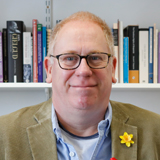Digital Storytelling
Transforming educational practices to promote inclusivity for hard-to-reach groups
Participation in learning has many positive benefits for both the individual learner and wider society.
However, many adults feel excluded from education due to a lack of opportunities, their anxieties around returning to study, and limited appropriate learning methods and tools.
One way to help overcome this is through digital storytelling (DS), a participatory creative process through which learners create a short video combining personal images and a voiceover.
This technique allows people with little or no computer experience to share their stories, develop literacy and computer skills, and acquire other competencies including decision-making, critical thinking and teamwork.
Our research has transformed the DS method, making it easier to tailor to the needs of diverse learners and to embed in real learning environments.
Our impact
Inspiring a new approach to teaching and learning
- Montgomery College and George Washington University now use DS to assess student projects.
- Belgian NGO Perspectives now offers DS courses to unemployed adult learners.
- A high school in Šiauliai (Lithuania) has been delivering DS training for teachers and international visitors since 2018.
Changes in practice at the US Smithsonian Institution
- The SCLDA Learning Lab delivered DS training sessions for teachers as part of its Living Through History Cornerstone.
- DS was used as an evaluation tool of educational programmes associated with the “Exploring Latinx Artists from the Frost Art Museum Collection” (Miami, Florida).
- The National Portrait Gallery (Washington DC) held a DS workshop around Latinx culture led by adult learners.
Adult education policy change in Spain
- Adult education provider CEPER Fuensanta successfully lobbied the Andalusian Government to introduce DS as part of its curriculum for adult learners.
The research
Working with partners across Europe and in the US, we have developed an innovative digital storytelling (DS) toolkit that allows previously excluded adult learners to successfully engage in lifelong learning.
Our practice-led approach has involved stakeholders – including learners, teachers, museum educators, and policy makers at institutions and within government – via DS training sessions, public engagement activities in museums and community centres, and policy workshops and focus groups.
Working closely with educators – predominantly from Community Colleges, Adult Education Centres and NGOs – we have demonstrated that co-designing and implementing a set of innovative tools to engage all participants in the co-creative process results in deeper and more lasting learning experiences.
In 2019, Dr Liguori successfully secured an AHRC International Placement Scheme Fellowship to work with the Smithsonian Institution. This enabled her to work with the museum’s educators to explore how DS can be used to make information come to life, engaging participants emotionally and enhancing their learning.
Some of the digital stories, tools and templates created during this research are available on the Smithsonian Learning Lab which received the Webby Award for Best Education Website in 2019.
Working with Dr Liguori taught me that you can aim for the stars. People’s voices matter, and by helping visitors and colleagues to use them, we really do contribute to a more just future.
Research funders
- AHRC
- European Commission
Development partners
- Smithsonian Institution, USA
- Montgomery College, USA
- Fairfax County Public Schools’ Family Literacy Program, USA
- CEPER Fuensanta, Spain

